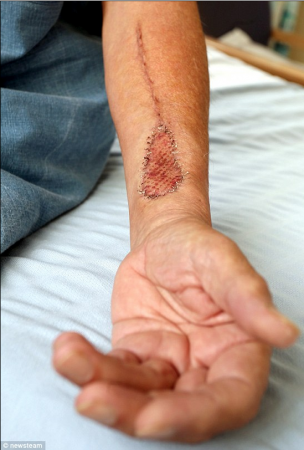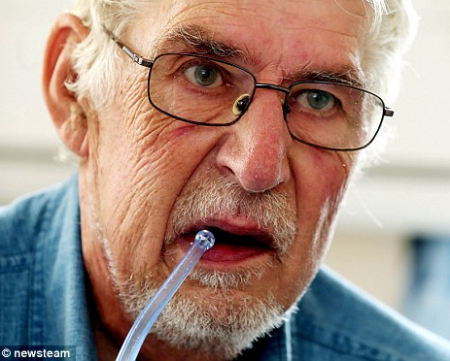Source: www.dailymail.co.uk
Author: Madlen Davies
When David Barwell was diagnosed with the advanced mouth cancer, he feared he would never speak or eat again. But now, British surgeons have rebuilt his entire oral cavity using tissue from his arm, in a 15-hour operation.

They had to remove a tumour the size of a plum from his throat, forcing them to cut away the bottom of his mouth and tongue. But medics were able to use skin and blood vessels from his arm to rebuild the oral cavity, and re-model his tongue.
The operation will allow him to eat, drink and one day speak again, they hope. British-born Mr Barwell, who was living in Poland when he was diagnosed, travelled across Europe in a campervan to come back to Britain for treatment. Now recovering from the operation, he and his wife of 28 years, Barbara, have praised the NHS and its staff as ‘incredible’. Mrs Barwell, a 67-year-old mother-of-one, was fought back tears as she thanked the NHS for its work.
She said: ‘These people are amazing. After working for 15 hours to save David’s life and rebuild his mouth the surgeon, Mr McVicar, called me personally to tell me the operation had worked, and I could not believe it. I have never seen treatment so good, not anywhere in Europe.’
Mrs Barwell, who grew up in Poland but moved to Nottingham in the 1980s to study, added:
‘We used to make plans, both as a family and a business, but now we just can’t. We just want to take one day at a time and build a new life and start again. It will be different but we just have to hope that the cancer in his mouth will be totally gone and won’t come back. Usually people give cards to staff, and I will, but these wards are so incredible that I want to say more to thank them. The whole team are the best; it’s a very special world in here, one of hope and kindness.’
‘David writes me a note every day saying he loves me and thanking me for my devotion to him. We are so happy together and I am so thankful to the staff.’
Now recovering from the operation, Mr Barwell is fed through a tube into his stomach and uses a suction pipe to control his saliva. He is not yet able to speak properly, but he has expressed his thanks to staff at Nottingham’s Queen’s Medical Centre in a heartfelt note.
He wrote: ‘I am very grateful to Mr McVicar and his team for their help and support during this terrible illness. The treatment I have received has been first-class.’
Mr Barwell, who owns a Nottingham packaging company with his wife, began feeling unwell in October last year. But his illness initially misdiagnosed by doctors in Spain and Poland, where the couple had been living for nine years, and he was treated for an infection and given antibiotics. Finally, he was diagnosed with T4 mouth cancer in Poland in March, after losing almost four stone (25kg) in less than three months.
A T4 tumour is the most serious and hard-to-treat stage of the disease, because the cancer has spread from the mouth into nearby muscles, bones or skin. When doctors in Poland were unable to treat the disease, Mr Barwell drove back to Nottingham in a campervan to receive NHS care. Mr Iain McVicar, consultant maxillofacial surgeon for Nottingham University Hospitals, who operated on Mr Barwell, said: ‘It was a complicated situation with him living in Poland.
‘It might have been a much smaller procedure if it had been six or eight months before.
‘It [the tumour] would have got bigger and would have killed him.’
He added: ‘When you wake up you are just grateful you are alive because this kind of surgery carries a risk of death.
‘But he’s made the first leap and he’s done very well.’
Doctors are currently assessing whether Mr Barwell will need any further treatment or surgery.

‘This is only the first part of the treatment, he’s probably going to need radiotherapy. It’s quite a complicated problem,’ said Mr McVicar.
‘It’s a very big operation and he’s not out of the woods yet but, hopefully, the tumour has been completely removed.
‘Hopefully he will ultimately be able to eat, drink and talk freely.’
It is also hoped he will be able to speak again with the help of therapists. Both Mr Barwell’s family and hospital staff say people need to be more aware of any changes in their mouths and more willing to go to a doctor or dentist to get help.
Mrs Barwell said: ‘I want people to be more forceful, and not just sit back and take antibiotics and ignore it. If it’s worrying you should see a doctor.
‘They need to be aware of what is wrong with them and look after themselves.’
Mr McVicar agreed, saying: ‘If people have something not right in their mouth for more than two weeks they should get it looked at.’

Leave A Comment
You must be logged in to post a comment.